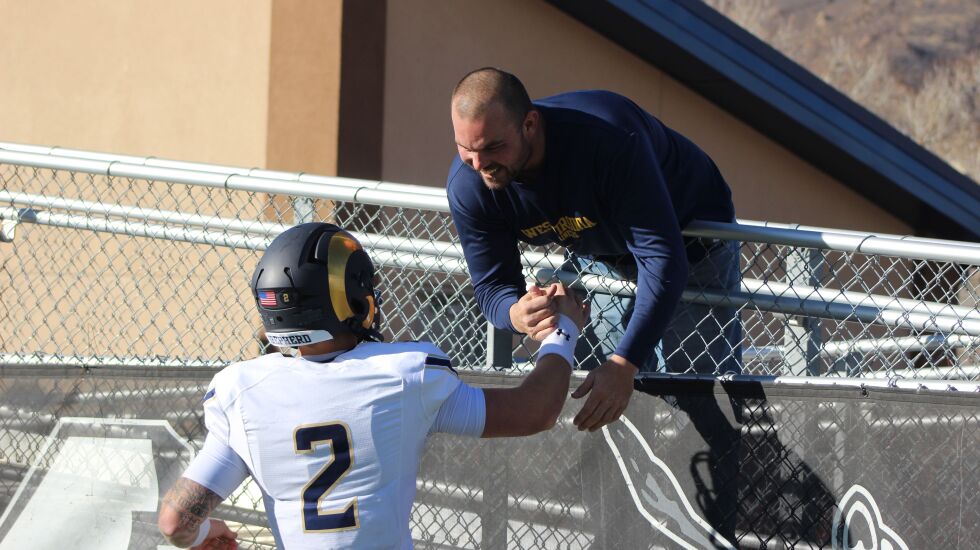
Travis Bagent’s left arm made him infamous. He wants his son’s right arm to do the same for him.
In a sense, it already has. Before agreeing to sign with the Bears as an undrafted free agent, Shepherd University quarterback Tyson Bagent was among the greatest Division II players ever. No Divison II passer has ever thrown for more than his 17,034 yards, and no one at any level of NCAA football can claim as many touchdown passes as his 159.
His monster numbers and suitable NFL size — he’s 6-3, 213 pounds — earned Tyson a trip to the Senior Bowl, where he played on Bears offensive coordinator Luke Getsy’s American team. He went 17-for-22 for 138 yards and one interception.
Scouts from all 32 teams visited Shepherd last year, but the Bears showed the most interest in Bagent during the draft process. They landed an agreement with him before the draft ended Saturday.
It’s a long way from Shepherd to the NFL — but only a couple blocks from campus to the former Big Arm Bar and Grill in Shepherdstown, West Virginia. That’s where Travis first began the career that brought him infamy: arm-wrestling.
Travis’ dad owned the place, which boasted padded arm-wrestling tables and, eventually, tournaments featuring some of the best in the world. Travis was 14 when he first started facing off against pros. He’s since won 28 different world titles as an arm wrestler. Seventeen came left-handed, and many consider him the best lefty in the sport’s history.
He’s just as good of a trash-talker. Nicknamed “The Beast,” Travis sounds, even in casual moments, as if he’s cutting a WWE promotional clip. His voice is boastful and charming in equal, gravelly measures. He’s in show business, he admits, but has chosen to live in what he calls a “positive, super-fun” state.
“If it seems a cocky and a little overboard? Great,” he said.
Tyson coached his son from ages 6-12, boasting that he threw about 200 touchdowns during that time. It didn’t take long — maybe around age 8 — for the two to hatch the dream of playing in the NFL.
“There was very little arm-wrestling from that point on,” Travis said.
He’s built Tyson up ever since — “An overwhelmingly unrealistic amount of confidence when I probably didn’t even deserve it,” the quarterback said — and figures he’s speaking his son’s future into existence with each sound bite.
“There’s no doubt he has an uphill battle,” Travis said. “I’m just anxious for what I believe will happen, for it to happen — for us to be the kings of Chicago.”
Just making the team would be an accomplishment. No Division II quarterback has been drafted since 1994 and no Shepherd player has done so since 1979. Only about 70 NFL players who appear in NFL games each year — out of about 1,700 — come from the Division II level or below.
“It would have been sweet to hear his name called [in the draft],” Travis said. “But the fact is, we understand completely that the level of competition we came from was going to induce those biases and fears.”
A no-star recruit, Tyson chose Shepherd, which is about 10 miles away from his high school in Martinsburg, West Virginia, and alma mater of both Travis and wife Casey.
He entered the transfer portal last year but decided to stay at Shepherd to remain near his ailing grandfather, who wanted to see him graduate. Transferring to a big-time program would have required him to knock out almost 50 more credit hours to reach graduation.
At Shepherd, Tyson said, he learned how to “do the most you can with as little as you have.” The school had two trainers for all of their sports teams, combined. There was no training table food. Their weight room wasn’t as nice as the one at Tyson’s high school.
About 5,000 fans went to Shepherd’s home games, and Tyson gave them plenty to cheer about. He played for four full seasons plus a one-game season during the coronavirus, starting every game. He had a knack for the position and the athleticism to back it up — he can walk the full 100 yards of a football field on his hands.
“I told every NFL scout that came in here: I don’t know if he can make your team, I don’t if he can play in the NFL,” Shepherd head coach Ernie McCook said. “But whoever jumps up on the table for him and gives him the opportunity is never going to regret giving him the keys to the facility.”
He knew Tyson was special during his sophomore year. When his offensive coordinator told Tyson he’d have to take break from watching film over the summer because he was taking his family for a weeklong beach vacation, the quarterback came to his house. While the family packed, he watched cut-ups of concepts.
“Everything he does he does to the best he can possibly be,” McCook said.
But is that good enough? Friday, the Bears began to find out.
“That’s why we bring him here, right?” Bears coach Matt Eberflus said. “We see him operate, we see what he does in the walkthroughs, see what he does in the individual and then the team periods and then really just evaluate the guy.
“We really don’t care where they’re from now. They’re here.”







